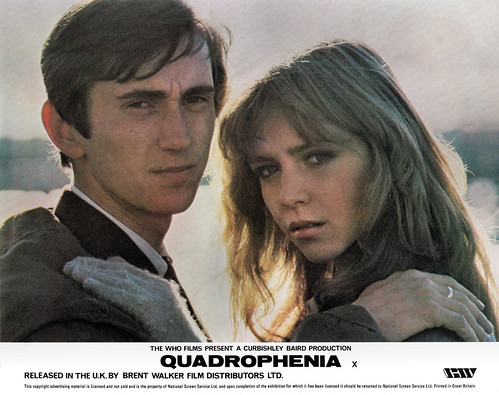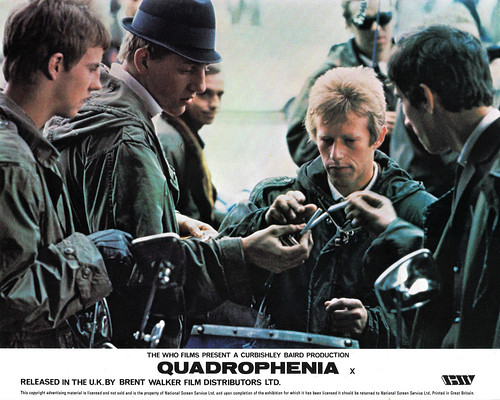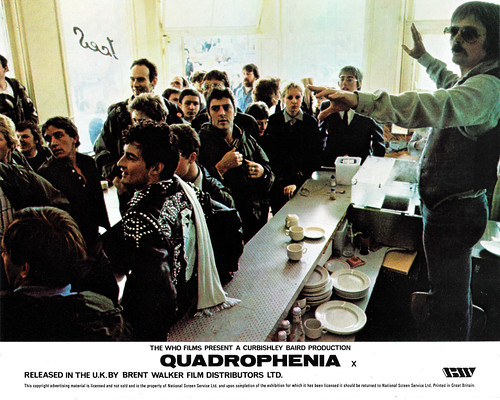
British lobby card. Photo: Curbishley Baird Production / Brent Walker Film Distributors. Phil Daniels and Leslie Ash in Quadrophenia (Franc Roddam, 1979).

British lobby card. Photo: Curbishley Baird Production / Brent Walker Film Distributors. Phil Daniels and Leslie Ash in Quadrophenia (Franc Roddam, 1979).

British lobby card. Photo: Curbishley Baird Production / Brent Walker Film Distributors. Sting in Quadrophenia (Franc Roddam, 1979).
Mods and Rockers at odds
Quadrophenia (1979) deals with the identity conflicts of British working-class youth in the mid-1960s and their subcultures. It is 1964 in London and young James Michael "Jimmy" Cooper (Phil Daniels) is a member of the Mods, a movement of well-dressed young men riding Vespa and Lambretta scooters with several mirrors on the leg shield. "I don't wanna be the same as everyone else. That's why I'm a Mod, see? ", Jimmy says at the start of the film.
The Mods are the counterparts of the Rockers, with whom they are always at odds. The Rockers dress in black leather and ride heavy motorbikes. Disillusioned by his parents and his boring job as an office messenger at an advertising agency, Jimmy only finds an outlet for his bleak and depressing life with his Mod friends Dave (Mark Wingett), Chalky (Phil Davis) and Spider (Gary Shail). They cruise London on their scooters, celebrate parties and take "coloured pills" (amphetamines), which they obtain by breaking into pharmacies.
The first big conflict for Jimmy comes when he meets his old friend Kevin (Ray Winstone) again, who was in the army and turns out to be a rocker. In a late-night brawl involving both of them, Jimmy abandons Kevin and drives off, while Kevin is beaten up by the other mods. A three-day holiday gives both gangs an excuse to meet in the seaside resort Brighton during a big dance event. This eventually escalates into a bloody fight between the Mods and the Rockers on a Brighton beach. This event, incidentally, was based on a fight that actually happened.
In the over-familiar ending of Quadrophenia, it seems that Jimmy lets himself drift off a cliff as a form of suicide. Although Jimmy is not actually seen in this scene, the scooter is seen flying through the air and clattering on the rocks. This event sparked quite a debate about whether this Jimmy would be dead or not. The average answer is that Jimmy must have jumped off his scooter just before he could have fallen to his death. Several actors have said that it is the opening scene of the film that equals the ending. In it, Jimmy is seen walking away from the cliff unharmed (and without a scooter).
The buzz about the film's ending scene is largely misplaced, as the main character can clearly be seen in an instant on top of the cliff (completely unharmed), while the scooter floats through the air. Indeed, the opening scene is Jimmy walking back to the overhang from the cliff. Symbolically, he has thrown the mod culture in the trash and Ace Face's scooter in the process. He had found out that Ace Face's heroism and rebelliousness is only fake. Sting, then still the singer of the band The Police, played Ace Face in his film debut.

British postcard by Splash, Manchester, X017. The Who.

British lobby card. Photo: Curbishley Baird Production / Brent Walker Film Distributors. Phil Davis in Quadrophenia (Franc Roddam, 1979).
Extremely believable from the start to the finish
Quadrophenia (1979), which was also Franc Roddam's directorial debut, got mixed reviews. Janet Maslin, reviewing the film for The New York Times in 1979, called it "...gritty and ragged and sometimes quite beautiful", creating a "...slice-of-life movie that feels tremendously authentic in its sentiments as well as its details." Maslin states that the director's scenes of youth battles "...capture a fierce, dizzying excitement that epitomizes a kind of youthful extreme."
Other critics rejected the film because of the large amount of sex, violence, and drug abuse, Today the film is considered a cult classic and a realistic reflection of youth culture in the 1960s. Consequently, many have since praised Phil Daniels' performance. Sting's appearance in the film also gave his band The Police a positive push, even though their music is totally out of step with traditional mod taste.
The film had a major impact on the brief mod revival in the music and fashion world. This revival paved the way for careers for bands such as Secret Affair, The Chords and The Lambrettas, who capitalised on the popularity of The Jam.
Michael Elliott at IMDb: "I never was a big fan of the film TOMMY but I found this one here to be much better overall. I think the greatest thing going for this film is the soundtrack, which not only includes The Who songs from this album but we also get some of their older material (a memorable bit on 'My Generation') as well as songs from other artists. This soundtrack is certainly something terrific and The Who songs are put to good use here.
Another thing working well is the performance of Daniels who perfectly nails this troubled character. I thought he was extremely believable from the start to the finish as he perfectly nailed the various emotions that this teenager is going through. I thought he was especially good towards the end once the guy starts to finally have a breakdown."

British lobby card. Photo: Curbishley Baird Production / Brent Walker Film Distributors. Publicity still for Quadrophenia (Franc Roddam, 1979).

British lobby card. Photo: Curbishley Baird Production / Brent Walker Film Distributors. Publicity still for Quadrophenia (Franc Roddam, 1979).

British lobby card. Photo: Curbishley Baird Production / Brent Walker Film Distributors. Phil Daniels in Quadrophenia (Franc Roddam, 1979).
Sources: Michael Elliott (IMDb), Wikipedia (Dutch, German and English), and IMDb.
No comments:
Post a Comment